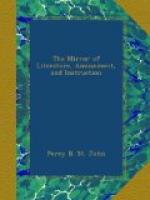“In the evening of the 17th of June, Rupert darted out of Oxford with his cavalry on a predatory expedition. At three in the morning of the following day, he attacked and dispersed a few parliamentary soldiers who were quartered at Postcombe. He then flew to Chinnor, burned the village, killed or took all the troops who were posted there, and prepared to hurry back with his booty and his prisoners to Oxford.
“Hampden had, on the preceding day, strongly represented to Essex the danger to which this part of the line was exposed. As soon as he received intelligence of Rupert’s incursion, he sent off a horseman with a message to the General. The cavaliers, he said, could return only by Chiselhampton Bridge. A force ought to be instantly dispatched in that direction, for the purpose of intercepting them. In the meantime, he resolved to set out with all the cavalry that he could muster, for the purpose of impeding the march of the enemy till Essex could take measures for cutting off their retreat. A considerable body of horse and dragoons volunteered to follow him. He was not their commander. He did not even belong to their branch of the service. But ‘he was,’ says Lord Clarendon, ’second to none but the General himself in the observance and application of all men.’ On the field of Chalgrove he came up with Rupert. A fierce skirmish ensued. In the first charge, Hampden was struck in the shoulder by two bullets, which broke the bone, and lodged in his body. The troops of the Parliament lost heart and gave way. Rupert, after pursuing them for a short time, hastened to cross the bridge, and made his retreat unmolested to Oxford.
“Hampden, with his head drooping, and his hands leaning on his horse’s neck, moved feebly out of the battle. The mansion which had been inhabited by his father-in-law, and from which in his youth he had carried home his bride, Elizabeth, was in sight. There still remains an affecting tradition, that he looked for a moment towards that beloved house, and made an effort to go thither to die. But the enemy lay in that direction. He turned his horse towards Thame, where he arrived almost fainting with agony. The surgeons dressed his wounds. But there was no hope. The pain which he suffered was most excruciating. But he endured it with admirable firmness and resignation. His first care was for his country. He wrote from his bed several letters to London concerning public affairs, and sent a last pressing message to the head-quarters, recommending that the dispersed forces should be concentrated. When his last public duties were performed, he calmly prepared himself to die. He was attended by a clergyman of the Church of England, with whom he had lived in habits of intimacy, and by the chaplain of the Buckinghamshire Green-coats, Dr. Spurton, whom Baxter describes as a famous and excellent divine.




